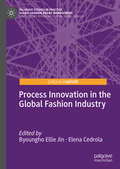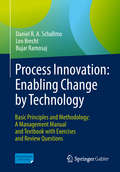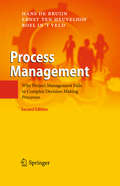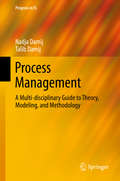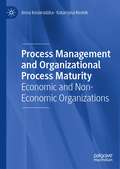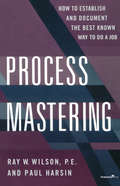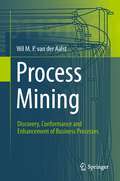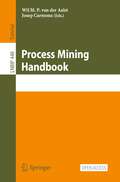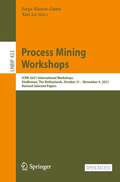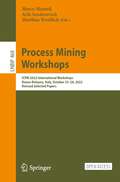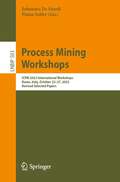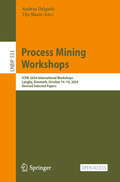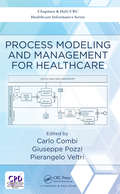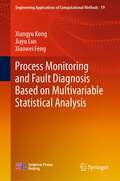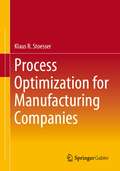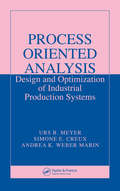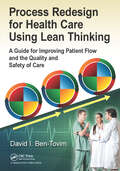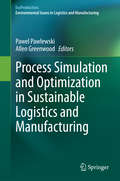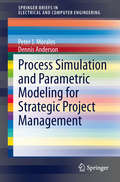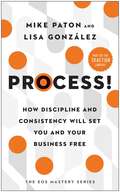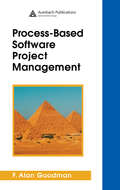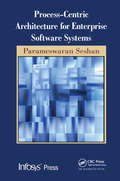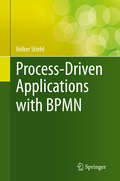- Table View
- List View
Process Innovation in the Global Fashion Industry (Palgrave Studies in Practice: Global Fashion Brand Management)
by Elena Cedrola Byoungho Ellie JinProcess innovations - an improved way of doing things – help firms achieve higher-level performance by reducing the time and cost to produce a product or perform a service, and increasing productivity and growth. This book provides a comprehensive examination of process innovations occurring in the global fashion industry, with a focus on fashion brands from USA, Italy, and Japan. It offers practical insights for enhancing efficiency in the supply chain as well as management process such as work routines, information flow, and organization structures. Using case analyses, this book will help readers to grasp how successful fashion companies optimize their operations and advance their competitive position by integrating process innovations into their supply chain and management systems.
Process Innovation: Basic Principles And Methodology: A Management Manual And Textbook With Exercises And Review Questions
by Daniel R. A. Schallmo Leo Brecht Bujar RamosajThis management manual and textbook introduces the theoretical basics of process management and provides a procedural model for process innovation. The procedural model makes it possible to develop customer-oriented processes in a structured manner and to design them in order to meet changing requirements. This textbook has been recommended and developed for university courses in Germany, Austria and Switzerland.This book enables readers to understand and apply the seven phase procedural model for process innovation in order to design and implement innovative processes.Exercises and review questions test understanding of the theoretically acquired knowledge.
Process Management
by Roel in 't Veld Ernst Ten Heuvelhof Hans De BruijnWhat is it that makes a manager or a politician a successful decision maker? Our first inclination would be to say decisiveness and substance. Many managers who met those criteria, however, had to abandon the field in the past several years. The authors of Process Management regard a manager as successful if he pays much attention to the process aspects of change. Successful management depends on the extent to which the
Process Management
by Nadja Damij Talib DamijProcess management affects the functioning of every organization and consequently affects each of us. This book focuses on the multi-disciplinary nature of process management by explaining its theoretical foundations in relation to other areas such as process analysis, knowledge management, and simulation. A crucial linkage between theory and concrete methodology of Tabular Application Development (TAD) is presented as a practical approach consisting of five phases that deal with process identification and modeling, process improvement, development of a process management system and finally - monitoring and maintenance. This book is important for researchers and students of business and management information systems, especially those dealing with courses on process management or related fields. Managers and professionals in process management will also find this book to be useful for their everyday business.
Process Management and Organizational Process Maturity: Economic and Non-Economic Organizations
by Katarzyna Rostek Anna KosieradzkaThis book addresses the need for a better understanding of the design, implementation and improvement of process management. It presents and organizes concepts and problems in the field of process management, and indicates supporting tools assigned to each of the four basic stages of the process life cycle (modeling, implementation, verification and perfection). By comparing non-economic and economic organisations, the authors demonstrate that a uniform approach to process management (one that does not take into account the specifics of an organizations goals) is ineffective; instead, process management needs to account for the individuality of an organisation. This book will appeal to researchers studying process and organizational excellence.
Process Mastering: How to Establish and Document the Best Known Way to Do a Job
by Paul HarsinThe benefits include: cost reduction; increased productivity; improved safety; higher morale; and the ability to meet the changing expectations of your customers.Step-by-step, the authors guide you through the creation and implementation of a process master. You will learn:Identify and gain control of your organization's key processes.Get the right people involved.Establish boundaries and measures.Use the process master to support ISO and HACCP complianceProcess Mastering contains two fully completed sample Process Masters as well as numerous improvement examples. An appendix provides blank Process Master forms and shows you how to use a Deployment Flow Chart.
Process Mining
by Wil M. van der AalstThe first to cover this missing link between data mining and process modeling, this book provides real-world techniques for monitoring and analyzing processes in real time. It is a powerful new tool destined to play a key role in business process management.
Process Mining Handbook (Lecture Notes in Business Information Processing #448)
by Wil M. P. van der Aalst Josep CarmonaThis is an open access book. This book comprises all the single courses given as part of the First Summer School on Process Mining, PMSS 2022, which was held in Aachen, Germany, during July 4-8, 2022. This volume contains 17 chapters organized into the following topical sections: Introduction; process discovery; conformance checking; data preprocessing; process enhancement and monitoring; assorted process mining topics; industrial perspective and applications; and closing.
Process Mining Workshops: ICPM 2021 International Workshops, Eindhoven, The Netherlands, October 31 – November 4, 2021, Revised Selected Papers (Lecture Notes in Business Information Processing #433)
by Jorge Munoz-Gama Xixi LuThis open access book constitutes revised selected papers from the International Workshops held at the Third International Conference on Process Mining, ICPM 2021, which took place in Eindhoven, The Netherlands, during October 31–November 4, 2021. The conference focuses on the area of process mining research and practice, including theory, algorithmic challenges, and applications. The co-located workshops provided a forum for novel research ideas. The 28 papers included in this volume were carefully reviewed and selected from 65 submissions. They stem from the following workshops: 2nd International Workshop on Event Data and Behavioral Analytics (EDBA) 2nd International Workshop on Leveraging Machine Learning in Process Mining (ML4PM) 2nd International Workshop on Streaming Analytics for Process Mining (SA4PM) 6th International Workshop on Process Querying, Manipulation, and Intelligence (PQMI) 4th International Workshop on Process-Oriented Data Science for Healthcare (PODS4H) 2nd International Workshop on Trust, Privacy, and Security in Process Analytics (TPSA)One survey paper on the results of the XES 2.0 Workshop is included.
Process Mining Workshops: ICPM 2022 International Workshops, Bozen-Bolzano, Italy, October 23–28, 2022, Revised Selected Papers (Lecture Notes in Business Information Processing #468)
by Matthias Weidlich Marco Montali Arik SenderovichThis open access book constitutes revised selected papers from the International Workshops held at the 4th International Conference on Process Mining, ICPM 2022, which took place in Bozen-Bolzano, Italy, during October 23–28, 2022. The conference focuses on the area of process mining research and practice, including theory, algorithmic challenges, and applications. The co-located workshops provided a forum for novel research ideas. The 42 papers included in this volume were carefully reviewed and selected from 89 submissions. They stem from the following workshops: – 3rd International Workshop on Event Data and Behavioral Analytics (EDBA)– 3rd International Workshop on Leveraging Machine Learning in Process Mining (ML4PM)– 3rd International Workshop on Responsible Process Mining (RPM) (previously known as Trust, Privacy and Security Aspects in Process Analytics)– 5th International Workshop on Process-Oriented Data Science for Healthcare (PODS4H)– 3rd International Workshop on Streaming Analytics for Process Mining (SA4PM)– 7th International Workshop on Process Querying, Manipulation, and Intelligence (PQMI)– 1st International Workshop on Education meets Process Mining (EduPM)– 1st International Workshop on Data Quality and Transformation in Process Mining (DQT-PM)
Process Mining Workshops: ICPM 2023 International Workshops, Rome, Italy, October 23–27, 2023, Revised Selected Papers (Lecture Notes in Business Information Processing #503)
by Pnina Soffer Johannes De SmedtThis volume constitutes the revised selected papers of several workshops which were held in conjunction with the 5th International Conference on Process Mining, ICPM 2023, held in Rome, Italy, in October 23–27, 2023.The 38 revised full papers presented in this book were carefully reviewed and selected from 85 submissions. The book also contains one invited talk. ICPM 2023 presented the following six workshops:– 4th International Workshop on Event Data and Behavioral Analytics (EdbA)– 4th International Workshop on Leveraging Machine Learning in Process Mining (ML4PM)– 6th International Workshop on Process-Oriented Data Science for Healthcare (PODS4H)– 8th International Workshop on Process Querying, Manipulation, and Intelligence (PQMI)– 2nd International Workshop on Education Meets Process Mining (EduPM)– 2nd International Workshop on Collaboration Mining for Distributed Systems (COMINDS).
Process Mining Workshops: ICPM 2024 International Workshops, Lyngby, Denmark, October 14–18, 2024, Revised Selected Papers (Lecture Notes in Business Information Processing #533)
by Andrea Delgado Tijs SlaatsThis book constitutes the revised accepted papers of several workshops which were held in conjunction with the 6th International Conference on Process Mining, ICPM 2024, held in Lyngby, Denmark, during October 2024. The 56 revised full papers presented in this book were carefully reviewed and selected from 126 submissions. The papers presented in this volume stem from the following workshops: – 9th International Workshop on Process Querying, Manipulation, and Intelligence (PQMI) – 3rd International Workshop on Education Meets Process Mining (EduPM) – 3rd International Workshop on Collaboration Mining for Distributed Systems (CoMinDS) – 5th International Workshop on Leveraging Machine Learning in Process Mining (ML4PM) – 5th International Workshop on Event Data and Behavioral Analytics (EdbA) – 7th International Workshop on Process-Oriented Data Science for Healthcare (PODS4H) – 1st International Workshop on Empirical Research in Process Mining (ERPM) – 1st International Workshop on Generative Artificial Intelligence for Process Mining (GenAI4PM) – 4th International Workshop on Stream Management & Analytics for Process Mining (SMA4PM) – 1st International Workshop on Process Mining for Sustainability (PM4S).
Process Modeling and Management for Healthcare (Chapman & Hall/CRC Healthcare Informatics Series)
by Carlo Combi Giuseppe Pozzi Pierangelo VeltriFrom the Foreword: "[This book] provides a comprehensive overview of the fundamental concepts in healthcare process management as well as some advanced topics in the cutting-edge research of the closely related areas. This book is ideal for graduate students and practitioners who want to build the foundations and develop novel contributions in healthcare process modeling and management." --Christopher Yang, Drexel University Process modeling and process management are traversal disciplines which have earned more and more relevance over the last two decades. Several research areas are involved within these disciplines, including database systems, database management, information systems, ERP, operations research, formal languages, and logic. Process Modeling and Management for Healthcare provides the reader with an in-depth analysis of what process modeling and process management techniques can do in healthcare, the major challenges faced, and those challenges remaining to be faced. The book features contributions from leading authors in the field. The book is structured into two parts. Part one covers fundamentals and basic concepts in healthcare. It explores the architecture of a process management environment, the flexibility of a process model, and the compliance of a process model. It also features a real application domain of patients suffering from age-related macular degeneration. Part two of the book includes advanced topics from the leading frontiers of scientific research on process management and healthcare. This section of the book covers software metrics to measure features of the process model as a software artifact. It includes process analysis to discover the formal properties of the process model prior to deploying it in real application domains. Abnormal situations and exceptions, as well as temporal clinical guidelines, are also presented in depth Pro.
Process Monitoring and Fault Diagnosis Based on Multivariable Statistical Analysis (Engineering Applications of Computational Methods #19)
by Xiangyu Kong Jiayu Luo Xiaowei FengThis book reports the developments of the Total Least Square (TLS) algorithms for parameter estimation and adaptive filtering. Specifically, this book introduces the authors’ latest achievements in the past 20 years, including the recursive TLS algorithms, the approximate inverse power iteration TLS algorithm, the neural based MCA algorithm, the neural based SVD algorithm, the neural based TLS algorithm, the TLS algorithms under non-Gaussian noises, performance analysis methods of TLS algorithms, etc. In order to faster the understanding and mastering of the new methods provided by this book for readers, before presenting each new method in each chapter, a specialized section is provided to review the closely related several basis models. Throughout the book, large of procedure of new methods are provided, and all new algorithms or methods proposed by us are tested and verified by numerical simulations or actual engineering applications. Readers will find illustrative demonstration examples on a range of industrial processes to study. Readers will find out the present deficiency and recent developments of the TLS parameter estimation fields, and learn from the the authors’ latest achievements or new methods around the practical industrial needs. In my opinion, this book can be assimilated by advanced undergraduates and graduate (PH.D.) students, as well as statisticians, because of the new tools in data analysis, applied mathematics experts, because of the novel theories and techniques that we propose, engineers, above all for the applications in control, system identification, computer vision, and signal processing.
Process Optimization for Manufacturing Companies
by Klaus R. StoesserErfahren Sie in diesem Buch über Prozessoptimierung für produzierende Unternehmen alles über die neue Methode LEO-3DIn seinem Buch „Prozessoptimierung für produzierende Unternehmen“ beschreibt Klaus R. Stoesser einen neuen, kombinierten Ansatz, mit dem Firmen aus dem produzierenden Gewerbe ihre Geschäftsprozesse optimieren können. Der Autor stellt hierfür Philosophien wie Lean Management, Six Sigma und SCRUM vor. Darauf aufbauend führt er seine eigens entwickelte Philosophie LEO-3D ein, welche Unternehmen vielseitige Möglichkeiten bietet.Der Inhalt im ÜberblickIm Kern geht es in Stoessers Buch über Prozessoptimierung für produzierende Unternehmen um folgende Themen:• Entwicklung der Prozessoptimierung• LEO-3D• Ausgewählte Methoden, Tools und VorgehensweisenEs vermittelt diese Ansätze, um Prozesse in Unternehmen ganzheitlich im zu verbessern und damit das Ergebnis nachhaltig zu steigern.
Process Oriented Analysis: Design and Optimization of Industrial Production Systems
by Urs B. Meyer Simone E. Creux Andrea K. Weber MarinIn modern manufacturing, it is not simply the equipment that is increasingly complex but rather the entire business system in which a company operates. Convoluted supply chains, complicated resource flows, advanced information systems: all must be taken into account when designing or reengineering a manufacturing system. Introducing a powerful yet
Process Redesign for Health Care Using Lean Thinking: A Guide for Improving Patient Flow and the Quality and Safety of Care
by David I. Ben-TovimProcess Redesign for Health Care Using Lean Thinking is a response to a simple, but hard to answer, question and is the result of the experiences of a working doctor who was also the chief safety and quality officer of an Australian teaching hospital. At this hospital, he observed that the Emergency Department was staff by talented, well-trained, and respected doctors and nurses. The facilities were modern, and the work load unexceptional, but the department was close to melt down. Bad things were happening to patients, everyone was blaming each other, lots of things had been tried but nothing was getting better and no one could explain why. The problem was not a lack of technical knowledge or expertise, the problem was that no one stood back and said, "what’s the best way to move 200 or 300 patients a day through the complicated and varying, sequence of steps needed to sort out the many different problems that bring patients to our department?" These challenges are faced by hospitals and health services all over the world. There are difficulties with patient flow, congestion, queues, inefficient utilization of resources, problems engaging clinical staff in improvement programs, adverse incidents, and budget constraints. Lean thinking and value stream analysis gives hospitals and health services struggling with these issues the insights they need to help themselves. This book provides a method that systematically turns those insights into working programs of service and system redesign. The book is divided into two sections. The first section gives the background to the approach, and systematically works through the Process Redesign methodology, step-by-step. The second section is a series of case studies that show the methodology in action, what worked and what didn’t work. The goal of any process redesign is simple: the right care, for the right person, at the right time, in the right place, and right the first time. This book helps the people who work in hospitals and health services realize these goals by working together.
Process Simulation and Optimization in Sustainable Logistics and Manufacturing
by Pawel Pawlewski Allen GreenwoodThe aim of this book is to present qualitative aspects of logistics operations and supply chain management which help to implement the sustainable policy principles in the companies and public sector's institutions. Authors in individual chapters address the issues related to reverse network configuration, forward and reverse supply chain integration, CO2 reduction in transportation, improvement of the production operations and management of the recovery activities. Some best practices from different countries and industries are presented. This book will be valuable to both academics and practitioners wishing to deepen their knowledge in the field of logistics operations and management with regard to sustainability issues.
Process Simulation and Parametric Modeling for Strategic Project Management
by Dennis Anderson Peter J. MoralesProcess Simulation and Parametric Modeling for Strategic Project Management will offer CIOs, CTOs and Software Development Managers, IT Graduate Students an introduction to a set of technologies that will help them understand how to better plan software development projects, manage risk and have better insight into the complexities of the software development process. A novel methodology will be introduced that allows a software development manager to better plan and access risks in the early planning of a project. By providing a better model for early software development estimation and software development, managers will be better equipped to make more effective project portfolio investment choices. Moreover, the methodology will allow the software development manager to continually simulate scenarios throughout the lifecycle of the project and determine plausible alternatives before the risk becomes a reality.
Process of Going Public in the United States
by Gregory S. MillerSummarizes the process of going public: the steps for SEC approval, the role of the SEC, and the roles of major players such as underwriters and printers.
Process of Strategy Definition and Implementation
by Clayton M. Christensen Jeremy B. DannStrategy definition is not a short, discrete process. Rather, outside influences (market, political, technological, etc.) and the company's own resource allocation process continually reshape an organization's strategy.
Process!: How Discipline and Consistency Will Set You and Your Business Free (The EOS Mastery Series)
by Mike Paton Lisa GonzálezThis deep-dive into the revolutionary EOS method to strengthen a company&’s process component will help leaders at all companies—from early stage startups to established corporations—run better businesses and live better lives. Part of the TRACTION Library, Process! proves that a high-level, 20/80 approach to getting your core processes &“followed by all&” will help you: Get consistently exceptional results Improve and innovate as necessary Free yourself to live your ideal life If you own, run, or lead in a fast-moving business, you&’re likely driven by passion and a desire to be free. Many leaders mistakenly believe instilling rigor and discipline for process throughout your organizations will inhibit freedom. They couldn&’t be more wrong. It&’s when you&’re stuck in the day-to-day, putting out fires and cleaning up messes, that passion turns to frustration. Freedom seems somewhere between elusive and impossible. The secret to getting unstuck is process. This inspiring, informative field guide will prove it&’s possible to establish rigor and discipline for process while also increasing creativity, flexibility, and innovation. Process! will help you identify a handful of core processes that make your business uniquely valuable. You&’ll learn how to document and simplify the major steps in those processes so they can be done the right and best way, every time. Finally, you&’ll execute a simple, step-by-step plan that is helping more than 10,000 entrepreneurs around the world consistently get the results they want.
Process-Based Software Project Management
by F. Alan GoodmanNot connecting software project management (SPM) to actual, real-world development processes can lead to a complete divorcing of SPM to software engineering that can undermine any successful software project. By explaining how a layered process architectural model improves operational efficiency, Process-Based Software Project Management out
Process-Centric Architecture for Enterprise Software Systems
by Parameswaran SeshanThe increasing adoption of Business Process Management (BPM) has inspired pioneering software architects and developers to effectively leverage BPM-based software and process-centric architecture (PCA) to create software systems that enable essential business processes. Reflecting this emerging trend and evolving field, Process-Centric Architecture for Enterprise Software Systems provides a complete and accessible introduction explaining this architecture. The text presents, in detail, the analysis and design principles used in process-centric architecture. Illustrative examples demonstrate how to architect and design enterprise systems based on the business processes central to your organization. It covers the architectural aspects of business process management, the evolution of IT systems in enterprises, the importance of a business process focus, the role of workflows, business rules, enterprise application integration, and business process modeling languages such as WS-BPEL and BPML. It also investigates: Fundamental concepts of process-centric architecture style The PCA approach to architecting enterprise IT systems Business process driven applications and integration Two case studies that illustrate how to architect and design enterprise applications based on PCA SOA in the context of process-centric architecture Standards, technologies, and infrastructure behind PCA Explaining how to architect enterprise systems using a BPMS technology platform, J2EE components, and Web services, this forward-looking book will empower you to create systems centered on business processes and make today's enterprise processes successful and agile.
Process-Driven Applications with BPMN
by Volker StiehlHow can we optimize differentiating business processes and exploit their full potential? Here Volker Stiehl provides answers, utilizing the various options that the BPMN (Business Process Model and Notation) standard offers for planning, implementing and monitoring processes. The book presents an approach for implementing an architecture for applications that strives to find a balance between development and maintenance costs, sustainability, scalability and fault tolerance; that meets flexibility requirements without becoming inordinately complex itself; and that keeps the end application as abstract as possible from the system landscape in which it operates. Based on the semantic enhancements found in version 2. 0 of the BPMN standard, which have made it possible to execute process models, his approach exploits BPMN to create and run complete application architectures. In this context, BPMN is not just used to model the business processes of the application, as the "B" in BPMN might suggest; but also to model and execute the integration processes between the systems. Throughout the book, the software package SAP Process Orchestration is used to illustrate the implementation of the proposed architecture, yet all recommendations are intentionally kept generic so that they can be implemented on any other comparable platform as well. Software architects, IT managers, software developers and project managers, as well as students of information and business technology will find the book a valuable resource. The proposed application architecture offers them a detailed blueprint, the principles of which they can use to plan and implement process-driven distributed applications.
